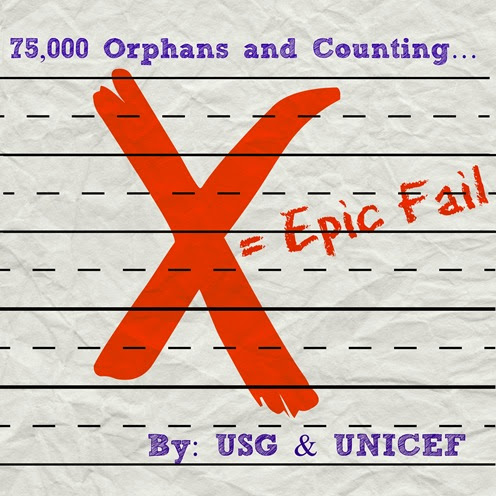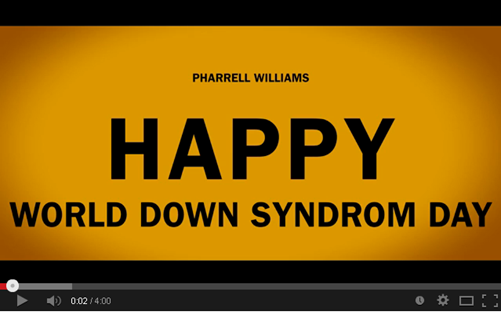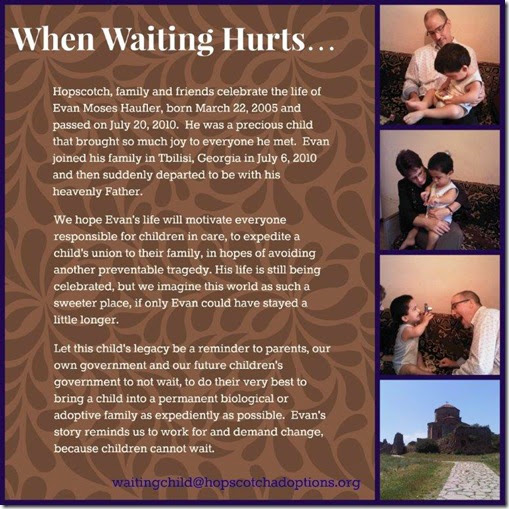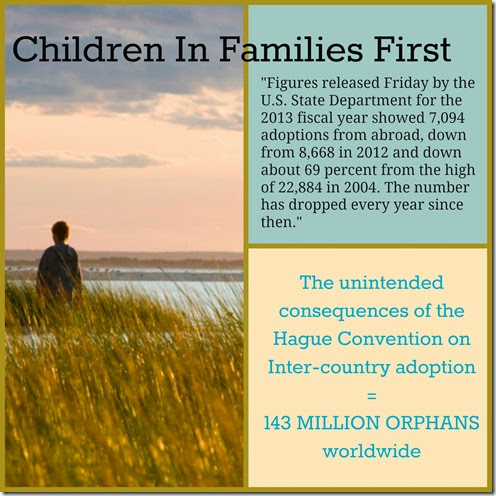Georgian Children's Reunion to be held in Atlanta, Georgia May 9-11, 2014 - Program and details to follow - mark your calendars and clear your weekend for a great time re-connecting to families with children/teens from Georgia and to our children's culture and community!
Sunday, March 30, 2014
75,000 Orphans and Counting…
Source: http://childrendeservefamilies.com/75000-orphans-counting/
By Kelly Ensslin
Kelly Ensslin has an insightful new blog post on the Both Ends Burning website about the newly released State Department adoption numbers, showing a drop for the ninth consecutive year in a row. The numbers over the past decade represent at least 75,000 orphans who have been deprived of permanent, loving families due to failed U.S. policy.
“Last Friday, the Department of State released its long-awaited annual international adoption statistics. As we had predicted, for the ninth straight year the number of children internationally adopted into permanent loving US families has fallen. In fiscal year 2013, only 7,094 children entered the United States on orphan visas. This number represents an 18% drop from the prior year and a 69% reduction since 2004, when international adoptions peaked at 22,884.
Saturday, March 29, 2014
6 things you shouldn’t say to, or in front of your child
Posted on http://lovinadoptin.com/2014/03/20/6-things-you-shouldnt-say-to-or-in-front-of-your-kids
Worthy and Reposted by Robin Sizemore, Executive Director of Hopscotch Adoptions, Inc
 Sometimes it’s common sense and sometimes it’s not. Despite that common sense we’ve all supposedly been given, I’ve heard some terrible things said in front of, and to, children. Guidance has also been disposed by some professionals that can be detrimental to a child’s healing (I mean completely stop it right in its tracks). Some of the points on this list may seem obvious to you, but I encourage you to read through them, because even parents with the best intentions can say things that are hurtful to a child. This can especially happen when a hurting child is acting out because of what’s going on inside of them. So, here they are:
Sometimes it’s common sense and sometimes it’s not. Despite that common sense we’ve all supposedly been given, I’ve heard some terrible things said in front of, and to, children. Guidance has also been disposed by some professionals that can be detrimental to a child’s healing (I mean completely stop it right in its tracks). Some of the points on this list may seem obvious to you, but I encourage you to read through them, because even parents with the best intentions can say things that are hurtful to a child. This can especially happen when a hurting child is acting out because of what’s going on inside of them. So, here they are:
- Don’t talk about how difficult your child is.
By making statements like, “Ezra is so naughty, you wouldn’t believe what he did today,” “Sarene is such a pistol, she knocked the lamp over again,” “Jared won’t stop hitting, he’s a brat at school.” These statements can make a child feel like they can’t do anything good, especially if 70% of their behavior is negative, it can shine like a negativity rainbow around them. Your child already feels like they can’t do anything right, children will blame themselves for being removed from their birth family, for being in an orphanage, for moving from one foster home to another. They may even feel worthless, so talking about what they aren’t doing right doesn’t help. When your child has negative behavior decide whether there will be a consequence, and leave the behavior there (meaning don’t carry it through to that night or the following days).
*The reason I say “decide” if there will be a consequence is because there are certain behaviors that shouldn’t have consequences: stashing/hoarding food, sneaking food, getting up in the middle of the night or not staying in bed, wetting the bed, and pottying their pants to name a few. These can all be indicative of an underlying problem, and frankly so are all behaviors.
Try to find out what is triggering your child, what is causing the problem, try to help them through it, and don’t jump to discipline first.
- Abstain from discussing the money you’re getting or not getting for foster care.
This one seems obvious to me, but obviously it’s not obvious to others, because I’ve heard it, or I wouldn’t list it. Parents forget their children can hear them, even if they’re chatting on the phone or talking to a friend while the kids play. Once, while standing in front of the Department of Human Services a foster mom talked with someone while her foster kids ran around her playing. She said, “I won’t adopt them (the kids who were with her!) unless they increase my stipend. This child needs_____ and that child needs_____ and they won’t increase my stipend to pay for it.”
If you want to talk about what the state is or isn’t paying you, it’s your right, but discussing it in front of your kids can be hugely problematic. They’ll feel they’re only wanted if you get enough money for them. And, honestly, no matter how little a state pays foster parents, it doesn’t mean children aren’t worth being cared for.
- Avoid talking about how easy your life was before them.
“Before you came, it was so peaceful here.” “There was no fighting until you came along.” “I’m always exhausted now.” – Statements like this will make a child feel unwanted and that they cause all the problems. When it’s true that it looks like the hurting child causes an immense amount of strife, we must remember it’s their past causing all the turmoil within them and rising to the surface. – Help yourself and find peaceful moments in your day to have to yourself.
- Refrain from telling them: “If you can’t follow the rules, you can’t live here,” or “I guess you don’t want to live here since you can’t follow the rules.”
Interestingly (I actually have another word for it) this is advice given by some therapists. This gives the impression that a child or teen is judged solely based on their negative behavior. And sorry, but if the only behaviors a child’s been taught are negative, they will have less then desirable behaviors.
Kids are also going to test you to see if you will stick with them through the bad. They’re going to prove to themselves no one will love them if they do wrong. In my opinion leaving the home is not an option. When you say they can’t live in your home if ____, it gives them an option. An option to miss out on love, possibly for the rest of their life.
- Don’t place blame on children by saying things like: “You’re ruining everything.”
Blame can also come across very strongly through actions and attitudes toward kids. I’ve seen this happen so often, and sometimes it’s perpetrated by therapists. They blame the child, saying, “See what you’re doing to your parents.” When it’s not a contemplated action against them, but rather a protective instinct because adults aren’t safe and are untrustworthy. A hurting child cannot heal themselves. Put blame anywhere else, but on a child. Do you blame your child for anything? Loss of anything, changing anything?
- Avoid talking about what the social workers are saying.
When doing foster care you are surrounded by social workers, they come in and out of your house, you talk to them on the phone, you email, you see them in court and at visits, and there can be a lot to discuss with your spouse, friends and family. But telling your kiddos what was said, or saying it when they can overhear you, can cause major behaviors among other problems. However, if discussions are serious about your foster child being reunited with their family then you need to share this with your child to prepare them.
Remember children are much smarter than many people give them credit for. Although it may seem like they aren’t listening, they are. While they’re playing, watching a movie, or sitting in the backseat, they’re listening.
Also, there are times when our own words, attitudes, and actions cause negative behaviors in our kids. I created this list so you can look at what you’re saying, or when you’re saying it, so you can avoid breakdowns and help your kids heal.
So you know, I’m far from perfect myself. I’ve said some things I regret. We can’t erase the past, but we can apologize and we all have a chance to change what we say from here forward.
Friday, March 28, 2014
International Adoption’s Drastic Decline: Why US Government Policy is Significantly To Blame
By Diane Kunz
U.S. government policy is significantly to blame for the drastic decline in international adoption. The US government views international adoption as something to protect children from rather than a form of protection for children. Let me explain.
Over the last five years the USG has taken a consistently negative approach on international adoption. The Department of State has adopted UNICEF’s policy which is that international adoption is to be shunned. It is DOS and UNICEF which advance the proposition that countries should reject international adoption as a method of family formation. When speaking at international forums such as the Fifth International Policy Conference on the African Child: Intercountry Adoption: Alternatives and Controversies (May 29-30, 2012; http://www.africanchildforum.org/ipc/), DOS and UNICEF speak with one voice, defining international adoption as cultural genocide, a sign of national failure or as a cover for fraud. As the USG has funneled billions of dollars of aid through UNICEF in the last five years, it is no surprise that developing countries are following this prescription.
The USG has not usefully aided countries which wish to join the Hague Convention on Intercountry Adoption. DOS, our Central Authority, has not given the level of technical advice and training that could bring good programs into existence. Instead we criticize other countries’ efforts and find them unacceptable (The record of our interactions with Vietnam is relevant here.) We have not accorded appropriate respect to countries which have joined the Hague. Being a member of the Hague Convention should give foreign Central Authority decisions an analogous level of status as under the Uniform Child Custody Jurisdiction and Enforcement Act. DOS has taken the opposite approach, telling the Chinese what their laws mean, questioning the Ethiopians on their legal practices etc. Contrast the approach taken by DOS in Hague Abduction cases.
DOS has not used timely and appropriate diplomacy with other international adoption partners. Chinese officials have repeated told stakeholders that DOS is the worst central authority with which they have programs. We could probably not have prevented the Russian ban on international adoption to the United States but had DOS taken a more active role during the negotiations over the U.S.-Russian Bilateral Adoption Agreement, that treaty would have been effective, with regulations promulgated when the Russian ban was enacted. This would have most likely meant that Russian children (including biological siblings of children previously adopted here) who were already near the completion of their adoptions, would have come home to their American families.
DOS often uses fear of fraud as an explanation for its actions. Yet when USCIS examined over 2000 Ethiopian cases, its officials could find no case that should not have been approved. The Center for Adoption Policy has repeatedly asked DOS to require specific anti-fraud measures, with no results. It is almost as if DOS wants fraud to exist as an excuse to end all international adoption. Of course there are bad adoptions which call for specific bad actions to be ended and specific bad actors to be excluded from international adoption work. But instead of this proper focus, DOS is weaponizing these wrongful practices and targeting all international adoptions. Is there trafficking through adoption? There are a tiny number of documented cases and they are heinous. But the number is miniscule when compared to child trafficking done through illicit immigration schemes, and child snatching.
DOS has repeatedly been dilatory and lax in its efforts as the Central Authority. There have been numerous times over the last five years when I have contacted DOS with news of changes in various countries’ programs. I glean my information from online research. Surely DOS could have better information if it so chose. This lack of information causes true pain and suffering to potential adoptive parents. Just as bad are the continued flawed processing and the consistent burying of adoption cases under reams of paper. No wonder we have seen the pool of potential adoptive parents shrink because families, understandably, shy away from international adoption when they learn of these unnecessary pitfalls.
There is another way. The USG could take the opposite path and embrace international adoption as one legitimate method of family creation for unparented children. This is the goal a number of supporters are attempting to reach through the Children in Families First Act (CHIFF; S. 1530, H.R. 4143). As CHIFF directs: “All options for providing appropriate, protective, and permanent family care to children living without families must be considered concurrently and permanent solutions must be put in place as quickly as possible. Solutions include family preservation and reunification, kinship care, guardianship, domestic and Intercountry adoption, and other culturally acceptable forms of care that will result in appropriate, protective, and permanent family care. Preference should be given to options that optimize child best interests, which generally means options which provide children with fully protected legal status and parents with full legal status as parents, including full parental rights and responsibilities.”
In practice this policy would direct DOS, USCIS and USAID to use both money and soft power influence to promote policy which puts the goal of children having families first, including the use of international adoption as a legitimate option for unparented children, as well as advocating for other available solutions. Our government would allocate our foreign aid to help countries create child-centered solutions which would have general similarities but also take account of national differences. We would provide monetary and technical assistance to countries that were joining the Hague Convention and we would measure progress to make sure that best practices were put into place in a timely fashion. With our Hague partners we would take the position that once you have joined the Hague club, we respect and accept your domestic procedures. The USG position would aim to get to yes, rather than find ever more creative ways of saying no.
We would assure countries that in our multicultural nation, a child who comes here will be brought up with the greatest respect for her culture and will grow up as a citizen of the world. Nationalism has not increased in the last twenty years; one of the courses I taught at Yale (in my previous career as a diplomatic historian) traced the trajectory of nationalism, and I can vouch for that assertion. If you look at the number of immigrants who wish to come here and the lengths that they go to do so, one understands that nothing ideological stands in the way of the hope for a better life, for oneself, and for one’s children.
Currently, despite falling birth rates, millions of orphans and vulnerable children are at risk around the world. The USG can and should work with governments and international bodies to create permanent solutions for these children without families. Take China, for example. In Guangzhou the local government this year set up a child safe haven box where parents could leave children they could not care for. In ninety days 260 children were left there, completely overwhelming officials who closed down the facility because they had no room in the city’s orphanages. On an annual rate, the number of children abandoned in that one safe haven in that one three month period is 45 percent of the entire number of adoptions from China to the United States in FY 2013. Under our new approach, the USG would, together with Chinese officials, ameliorate difficulties so that these children could find permanent, loving homes.
In FY 2008, our first year as a Hague nation, there were 17, 456 adoptions into the US. Last year there were 7,094. Tens of thousands of children have been abandoned to the direst of fates. We must do better.
Dr. Diane B. Kunz, Esq. is Executive Director of the Center for Adoption Policy, a 501 (c) 3 corporation that has become a pre-eminent legal and policy institute engaged in adoption issues. The Center for Adoption Policy was honored in 2008 by the Congressional Coalition on Adoption Institute as an Angel in Adoption. Dr. Kunz has consulted with government agencies such as the Department of State, the Centers for Disease Control and USCIS and has been actively involved in helping deal with issues pertaining to the Haitian children who came to the United States under the humanitarian parole program. From 1976 to 1983 Dr. Kunz practiced corporate law with the firms of White & Case and Simpson Thacher & Bartlett (Cornell University, J.D. 1976). She left the practice of law and studied diplomatic and economic history at Oxford University (M. Litt. 1986) and Yale University (Ph.D, 1989). From 1988 until 1998 she was Assistant, then Associate Professor of History at Yale University. While at Yale she wrote extensively on twentieth century history, including the prize winning book, The Economic Diplomacy of the Suez Crisis and Butter and Guns: The Economic Diplomacy of the Cold War. From 1998-2001 she taught history and international relations at Columbia University. In 2001 she and Ann Reese founded the Center for Adoption Policy. Dr. Kunz is a member of the New York bar. She is an honorary fellow of the American Academy of Adoption Attorneys and the American Academy of Assisted Reproductive Technology Attorneys. She is also the mother of eight children, four of whom were born in China through the non-special needs and waiting children programs.
Georgian Association Issues a Statement Concerning Russia's Annexation of Crimea

Dear Friends,
The Georgian Association in the USA has issued a statement concerning Russia's Annexation of Crimea.
The transcript of the statement is reproduced below. Here is a link to the actual statement.
Sincerely,
Nino Aduashvili
Executive Director
Georgian Association in the USA, Inc.
Statement of the Georgian Association in the United States of America
The Georgian Association in the United States of America, the oldest organization representing the Georgian-American community, condemns Russia's annexation of Crimea in the strongest terms and fully supports the government of Ukraine in declaring the March 16th referendum on Crimea's independence illegal. The Association calls on the US Government to undertake all possible steps to protect the fundamental principles of international law, based on sovereignty and the territorial integrity of nation-states.
The Association calls on the Obama administration to ensure security guarantees for Georgia and to advocate forcefully for Georgia's accession into NATO. Granting Georgia the Membership Action Plan (MAP), which it has earned by meeting strict NATO requirements, is a more effective way to impose a real political cost on Moscow for its illegal and politically destabilizing activities, while demonstrating to Ukraine and other countries that the hard work of reform pays off.
Economic sanctions and a travel ban against individual members of the Russian political and military leadership alone are unlikely to convince Russia to withdraw its military from Crimea and to respect the territorial integrity of Ukraine for several reasons.
First, it is highly unlikely that sanctions alone will persuade President Putin to relinquish Crimea or to allow Ukraine out of Russia's political orbit. The Kremlin's desire to keep its immediate neighbors within its sphere of influence trump any economic interests that may be damaged by sanctions.
Second, based on their experience in 2008, President Putin and his circle are convinced that Russia can wait out sanctions. They expect Europe to cave in due to its dependence on Russian gas and the damaging economic losses that will result from tit-for-tat sanctions. Whether this belief is accurate is immaterial; what matters is that Putin and his inner circle perceive it to be true and will base their actions on this perception. Relying on economic sanctions will not yield their intended political effect, especially given the autocratic nature of the Russian government and its insensitivity to domestic pressures.
Offering NATO membership to Georgia is a proper strategic response. NATO membership, in concert with the EU's Eastern Partnership program, extends stability and prosperity to qualified countries, and serves the interests of the United States. The alternative is a Russian model of confrontation, dismemberment of neighboring states, instability and corrupt governance,
In order to extend NATO membership to Georgia, the US government should open immediate dialogue with its NATO partners, Germany and Turkey, as well as with the UK, which is the host nation of the next summit, to push Georgia's MAP forward at an accelerated pace.
Given Georgia's significant contributions to US-led military operations in Iraq and Afghanistan, its strategic location and its success in becoming a stable and democratic state, the Association calls on the US government to immediately begin negotiations with its NATO allies to ensure the rapid promotion of Georgia's NATO membership.
Board of Directors of the Georgian Association in the USA
Thursday, March 27, 2014
Tuesday, March 25, 2014
Celebrating World Down Syndrome Day 2014 ~ Happy!
"Happy" Video Celebrates World Syndrome Day 2014 - share on your social media too!
Click here to see the video.
Celebrating World Down Syndrome Day 2014
"Dear Future Mom" Video Celebrates World Syndrome Day 2014 - share on your social media too!
Click here to see the video.
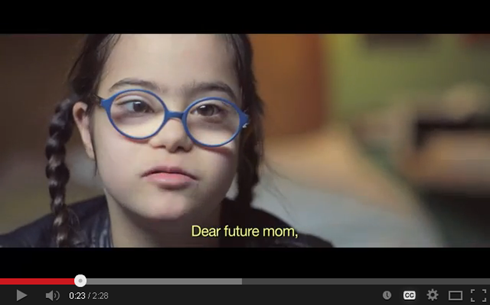
Sunday, March 23, 2014
Friday, March 21, 2014
Foreign Adoptions by Americans Decline Sharply
NEW YORK March 21, 2014 (AP)
By DAVID CRARY AP National Writer
The number of foreign children adopted by U.S. parents plunged by 18 percent last year to the lowest level since 1992, due in part to Russia's ban on adoptions by Americans. Adoptions from South Korea and Ethiopia also dropped sharply.
Figures released Friday by the U.S. State Department for the 2013 fiscal year showed 7,094 adoptions from abroad, down from 8,668 in 2012 and down about 69 percent from the high of 22,884 in 2004. The number has dropped every year since then.
As usual, China accounted for the most children adopted in the U.S. But its total of 2,306 was far below the peak of 7,903 in 2005.
Ethiopia was second at 993, a marked decline from 1,568 adoptions in 2012. Ethiopian authorities have been trying to place more abandoned children with relatives or foster families, and have intensified scrutiny of orphanages to ensure that children placed for adoption are not part of any improper scheme.
Russia had been No. 3 on the list in 2012, with 748 of its children adopted by Americans. But that number dropped to 250 for 2013, representing adoptions completed before Russia's ban took effect.
The ban served as retaliation for a U.S. law targeting alleged Russian human-rights violators. It also reflected resentment over the 60,000 Russian children adopted by Americans in the past two decades, about 20 of whom died from abuse, neglect or other causes while in the care of their adoptive parents.
Moving into the No. 3 spot for 2013 was Ukraine, currently engaged in political conflict with Russia. Ukraine accounted for 438 adoptions, followed by Haiti with 388, Congo with 313 and Uganda with 276.
Despite the relatively high numbers of adoptions from the Congo, that African country has been the cause of heartache from some American families trying to adopt Congolese children. In several instances, U.S. parents have obtained court approval for adoptions and taken custody of the children, only to be denied exit permits that would enable them to bring the children to the United States. They face a choice of living in the Congo with their children or returning to the U.S. without them.
"It's a terrible shame," said Susan Jacobs, the State Department's special adviser on children's issues.
Along with Russia and Ethiopia, the biggest contributor to the one-year drop was South Korea, which accounted for 627 U.S. adoptions in 2012 but only 138 last year. Jacobs said this decline was due primarily to new adoption procedures implemented by South Korea.
The last time there were fewer foreign adoptions to the U.S. was in 1992, when there were 6,472, and the downward trend has dismayed many advocates of international adoption.
Chuck Johnson, CEO of the National Council of Adoption, contended that the decline stems in part from the way the State Department has applied the Hague Convention on Inter-Country Adoption, which establishes ethical standards for international adoptions.
The U.S. entered into the agreement in 2008 with strong support from adoption advocates who hoped it would curtail fraud and corruption, and then lead to a boom in legitimate adoptions. Instead, the decrease has continued.
"The U.S. has encouraged and in some cases strong-armed impoverished countries to sign the Hague Convention and then cites their inability to comply with strict Hague standards as a reason for not doing intercountry adoption with them," Johnson said.
Johnson expressed hope that Congress would support a bill introduced with bipartisan support last year — the Children in Families First Act — that would encourage more adoptions of foreign orphans. It would create a new bureau in the State Department assigned to work with non-governmental organizations and foreign countries to minimize the number of children without families — through family preservation and reunification, kinship care, and domestic and international adoption.
Concerns about corruption, child-trafficking and baby-selling have prompted the United States to suspend adoptions from several countries in recent years, including Vietnam, Cambodia, Guatemala and Nepal.
However, Jacobs said some adoptions from Vietnam — mostly involving children with special needs — were expected to resume soon. She said a Vietnamese delegation was due in the U.S. next month to interview U.S. adoption agencies with the aim of selecting some to operate in Vietnam.
"One thing that remains constant is our support for intercountry adoptions and our determination that they are done ethically and transparently," Jacobs said. "I can't think of anything worse than for a child to be consigned to an institution when they should be with a family."
The State Department reported that 84 American children were adopted by residents of foreign countries last year — 35 of them went to Canada and 38 to the Netherlands.
State Department: http://adoption.state.gov/about—us/statistics.php
David Crary can be reached at http://twitter.com/CraryAP
Thursday, March 13, 2014
Where You Once Called Home
New Webinar! Tuesday April 1st, 2014 7:00PM CT

April 1st,2014 | 7:00 PM Central | Q&A 8:00 PM
Where You Once Called Home
Insights into Homeland Tours
If you're considering, or planning, a trip to your child's (or your own) birth country, many factors other than just travel influence how the trip goes.
Hear directly from adopted persons and parents who have taken homeland tours. They will share their personal experiences and feelings from preparation to the lasting impact of the their homeland travels.
To help parents or adopted persons plan their journey, our panel will discuss:
- What is the right age to travel?
- Preparing the adopted person for the experiences and situations they may encounter
- Preparing yourself (as parent, spouse, or friend) to support the adopted person through their feelings while on the trip
- Travel tips
- Finding the right persons to help the adopted person, and other family members, organize and take full advantage of the experiences and memories they bring back home.
Register Here!
Joint Council | (703) 535-8045 | info@jointcouncil.org |
117 South Saint Asaph Street
Alexandria, VA 22314
Wednesday, March 12, 2014
News From Serbia: Hopscotch welcomes home the Spring family's newest addition from Serbia!
News From Serbia: Hopscotch welcomes home the Spring family's newest addition from Serbia! Just a few more days and Audrey will be surrounded with the love of her anxiously awaiting family. We could not be happier for Audrey or her family. Hurry home!!!
In a few weeks, Leah Spring will be joining Hopscotch Adoptions as our Family Coordinator for Serbia. As an experienced adoptive parent and advocate, completed four Serbian adoptions of her own and assisted many other families since 2011, we are truly honored and excited to have Leah as the first person you'll speak with when inquiring about adoption from Serbia. Suffice to say, Leah knows a thing or two about Serbian adoptions!
Monday, March 10, 2014
Insights into Homeland Tours - Webinar April 1st 7pm CT
Webinar Series for Adoptive Families
Insights into Homeland Tours
TUESDAY; April 1; 7:00 PM CT
Where They Once Called Home
If you are thinking about or planning a trip to your child's birth country, there is more to consider than travel.
Learn from adopted people and adoptive parents who have taken that trip. Along with practical advice, they will share their personal experiences and feelings to help you understand the lasting impact a homeland tour may have on your child.
Our panel will discuss:
- Considering the right age to travel
- Preparing your child for the experiences and situations they may encounter
- Preparing yourself to support your child during the journey
- Travel tips and advice on how to organize the experiences and memories to make a lasting impact
Questions?
Email Mandi and Shane >
Co-sponsors

Monday, March 3, 2014
News From Armenia: One Bundle of Joy On Her Way Home
News from Armenia: One bundle of joy is on her way home from Armenia. Congrats to our Hopscotch family and welcome home beautiful girl!

